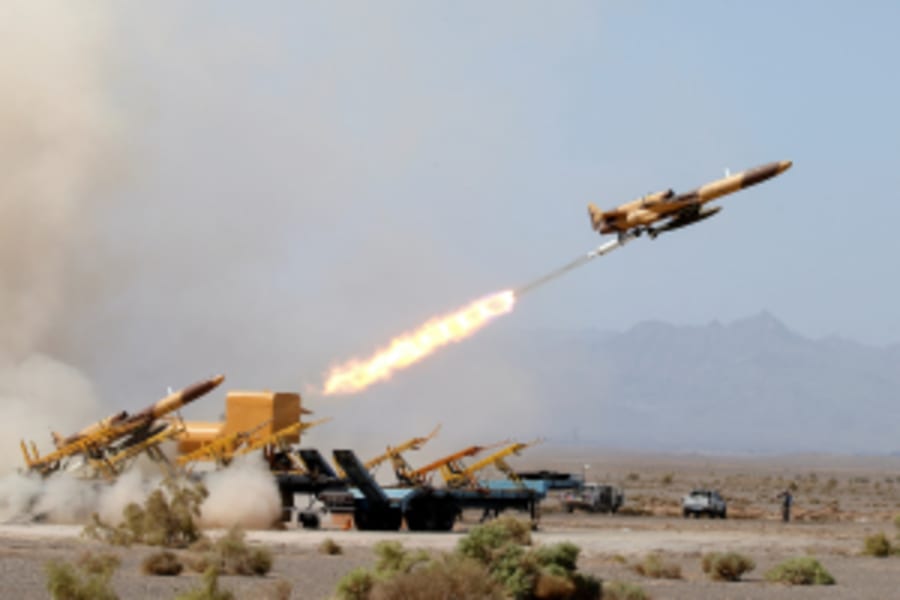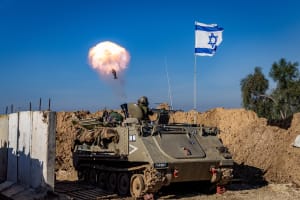Thousands of civilians flee southern Lebanon amid increased IDF strikes and explicit warnings
Lebanese media speculate if whether intensified strikes are precursor to ground invasion

IDF attacks on southern Lebanon intensified over the weekend as Israel started a concerted effort to restore calm to its northern communities. By Monday morning, the IDF struck over 300 targets in southern Lebanon while also calling on Lebanese civilians to evacuate areas being used by Hezbollah forces for launching attacks against Israel.
After the strikes began, the IDF emphasized that the army was only targeting houses that were known to contain Hezbollah launchers. “We're not just attacking houses,” a military source told Israel Hayom.
Shortly after the airstrikes in southern Lebanon began, IDF Spokesman Brig.-Gen. Daniel Hagari warned Lebanese civilians to flee the area in anticipation of additional strikes on known targets.
“This is an advance warning for your and your family’s safety. We advise civilians from Lebanese villages located in and next to buildings and areas used by Hezbollah for military purposes, such as those used to store weapons, to immediately move out of harm’s way for their own safety,” Hagari stated.
Hagari's announcement was quickly followed by a statement from IDF Arabic spokesman Col. Avichay Adraee, as well as via SMS messages =to residents of southern Lebanon and the Bekaa Valley.
By noon on Monday, reports from Lebanese news sites and social media documented hundreds of Lebanese civilians heeding the IDF’s warning by fleeing northward. Videos shared online showed long traffic jams caused by people driving north ahead of the expected increase in Israeli strikes.
Lebanese website L’Orient Today reported that Hezbollah members began going door-to-door in neighborhoods of the Nabatieh district, instructing residents to leave. The news organization also reported that many of the later strikes by Israeli forces have been in the areas surrounding Nabatieh.
The Lebanese Education Ministry announced that due to the worsening situation, it was preparing to host displaced citizens in northern schools.
Roads leading from southern Lebanon to Beirut saw heavy traffic on Monday, according to L’Orient Today.
The Lebanese news site Naharnet ran an article questioning whether Israel was only increasing its strikes to achieve deterrence or as a precursor to a possible ground incursion by Israeli forces.
Following reports from Beirut residents about receiving evacuation warning messages, Information Minister Ziad Makari's office informed AFP that it had also received a similar call, noting that it was a pre-recorded message.
According to a report in Reuters, the director of Lebanese telecom company, Ogero Communications, said that, on Monday morning, it had received over 80,000 calls allegedly from the Israeli government urging Lebanese civilians to evacuate their homes.
A UNIFIL source told the Qatari newspaper Al-Arabiy Al-Jadid that “UN forces have asked their officials and civilian employees to leave South Lebanon with their families.”
Sky News Arabic reported that by noon on Monday, Israel had struck more than 60 different towns and villages in southern Lebanon.
Lebanese media reported that at least 182 people had been killed, and hundreds more injured, in the Israeli strikes, however, there was no breakdown of civilian and combatant casualties.
The increased operational activity in the north follows the decision by the Israeli cabinet to add the return of the northern evacuees to their communities as an official war goal, as well as recent statements by defense leaders, including IDF Chief of Staff Herzi Halevi, who said Sunday evening, “We will safely return the residents to their homes, and if Hezbollah has not understood this yet, it will receive another blow and another blow - until this organization understands.”
On Monday morning, while IDF strikes were underway, former IDF General Staff Corps Commander Maj.-Gen. (res.) Gershon Hacohen spoke with Radio 103FM about the security situation in Israel’s north and in Lebanon.
“The reality is simple: We have no interest in Lebanon. The main direction is security conditions for the northern border settlements,” Hacohen said.
He continued: “There is a need to increase the pressure on Hezbollah. This may lead to a ground operation, which could be prolonged, but we hope it will lead to a new situation.”
At 2 p.m., Hagari conducted another briefing, during which he commented on videos of IDF strikes from Sunday and Monday that showed large explosions.
“What we are seeing right now in the south Lebanon are explosions of Hezbollah weapons exploding inside houses,” Hagari said. “Every house we attack has weapons – missiles and drones aimed at Israel civilians.”
Following his remarks, Adraee showed a map warning residents of the Bekaa Valley to flee the area, saying that the IDF’s upcoming attacks will target civilian homes known to contain Hezbollah weapons.
We recommend to read:

The All Israel News Staff is a team of journalists in Israel.














